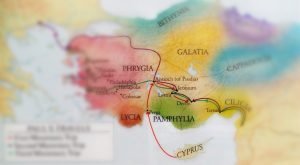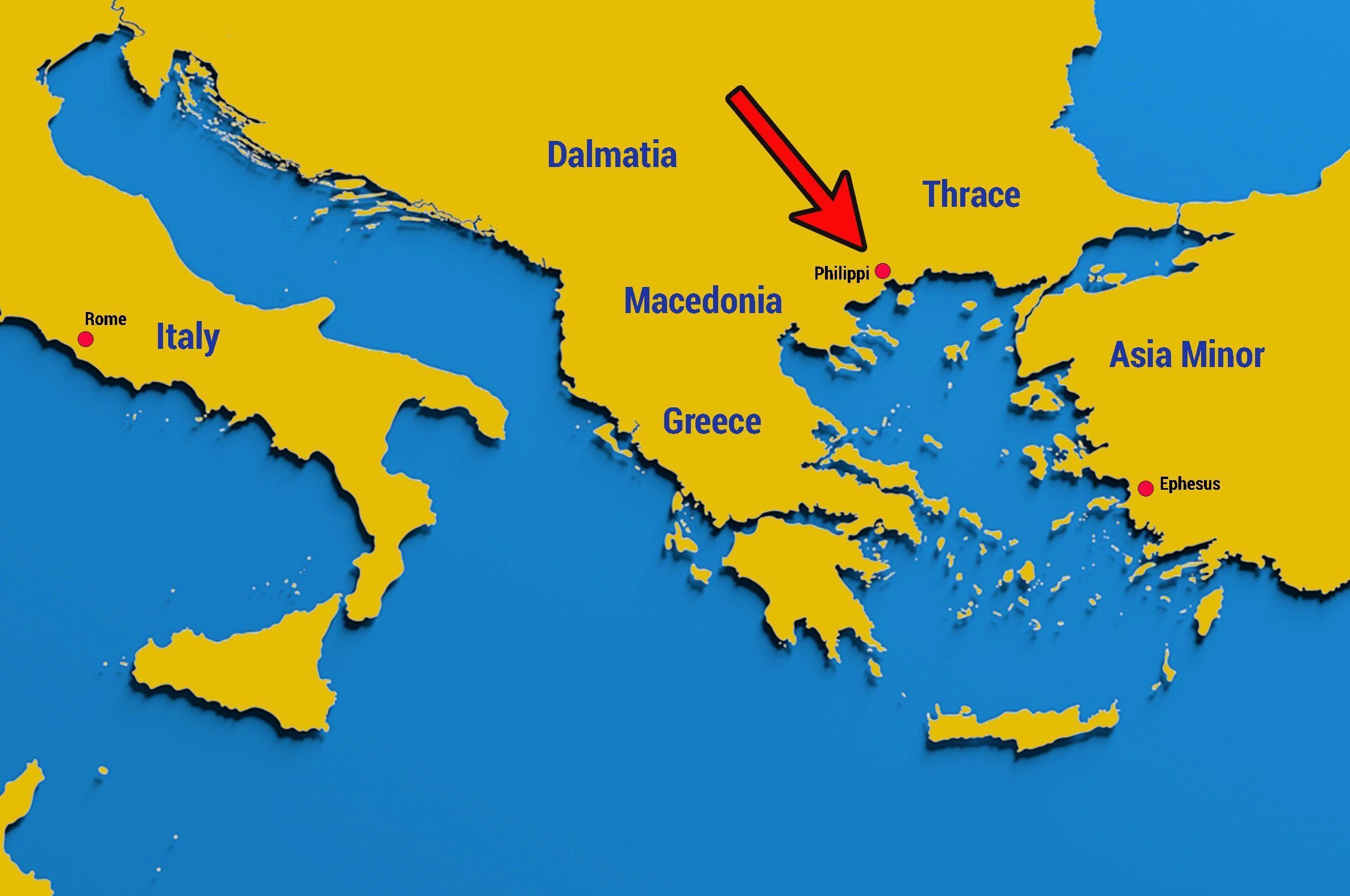Paul loved the saints in Philippi and they loved him back just as much.
 It was just an “ordinary” missionary tour for Paul and his new co-worker with him, Timothy, and they were preaching and checking up on the churches in Galatia. Paul had been through there before and wanted to strengthen the disciples in the area. They preached throughout Galatia and Phrygia and while they really desired to preach the word in the province of Asia, they were stopped by the Holy Spirit (Acts 16:1-10).
It was just an “ordinary” missionary tour for Paul and his new co-worker with him, Timothy, and they were preaching and checking up on the churches in Galatia. Paul had been through there before and wanted to strengthen the disciples in the area. They preached throughout Galatia and Phrygia and while they really desired to preach the word in the province of Asia, they were stopped by the Holy Spirit (Acts 16:1-10).
It was an enigma really. Why would the Holy Spirit keep stopping them from preaching in an area that they desired? The doors to Bithynia were just slammed shut. They could have disobeyed “in the name of the gospel” but they waited. And then Paul had a dream.
The people of Philippi must have been hungering and seeking God for the truth, a much greater truth than they were experiencing. Because “during the night Paul had a vision of a man of Macedonia standing and begging him, “Come over to Macedonia and help us.” (Acts 16:9).
There it was!
So Paul, Luke, Timothy, Silas and several others got ready at once to go over to Macedonia to find the man they he had seen in his vision, “concluding that God had called us to preach the gospel to them” (16:10). They arranged a boat and then sailed to the Roman colony of Philippi in Macedonia.
The Journey of the City of Philippi
Historically Philippi had been a “nothing” kind of village in the province of Macedonia. That is, until gold was discovered. At the report of the new wealth Philip, who was King over the province Macedonia rushed in and claimed it for himself. He then christened the village now-turned-city after his own name, calling it “Philippi” (357 BCE). He then used the gold to finance the expansion of the Greek empire. In fact, his youthful son but extraordinary military leader, Alexander the Great, was the one who most benefited by this financing as he led the Greek armies to conquer the whole area around the Mediterranean.
Some time later the Romans gained power. It was their turn to beat everybody up (168 BC) and now they took rulership over Philippi (146 BC). They kept the name but made the city into a Roman colony. The set up defenses, settled military veterans and even produced an independent local coinage. The Via Egnatia was established next which was a main road connecting north and south, with Philippi as a prominent stopping point between the two. Philippi was no longer an insignificant little village not far from the sea.
In 42 BC an epic battle took place here with Mark Antony and Octavian battling Brutus and Cassius to get revenge on these assassins of Julius Caeasar. It was the largest Roman battle to date with 200,000 men engaged and a painful 40,000 casualties.
A scant 10 years later Octavian turned on Mark Antony, his former battle partner, and won. Then in 31 BC the city was used to settle Italians who had been displaced because of the vast Roman reforms. Because of its growing importance, Philippi soon became the distinguished city to bear the honor as an official Colony of Julius Augustus, the Roman Emperor.
Around 70 years later, around 49 AD, enter another man who was probably praying and praying, asking God for the truth. And out of it God spoke to Paul to not go to Asia, but to head over to the hungry hearts of Macedonia.
When Paul and His Team Arrived
So there they found themselves, sailing to the beautiful town of Philippi. It was not just a Roman colony but a leading city of Macedonia. Paul and his companions stayed there several days. Here’s his journal:
“On the Sabbath we went outside the city gate to the river, where we expected to find a place of prayer. We sat down and began to speak to the women who had gathered there. One of those listening was a woman named Lydia, a dealer in purple cloth from the city of Thyatira, who was a worshiper of God. The Lord opened her heart to respond to Paul[‘s message. When she and the members of her household were baptized, she invited us to her home. “If you consider me a believer in the Lord,” she said, “come and stay at my house.” And she persuaded us.” (16:13-15).
It’s interesting to note that while it was a man in the vision that Paul had seen, the Lord led them to a woman. Paul could have become obsessed with finding “the man in the vision” but he didn’t; he saw the opportunity in front of him.
During their time in Philippi as Paul and Silas were praying, they were harassed by a slave girl who was demonized. Paul became so troubled that he drove the spirit out of the girl. But when the owners of the girl realized she would no longer be the profit-generation machine that they had come to expect, they turned the town against Paul which eventually led to their imprisonment.
Paul and Silas were singing in their prison, worshiping and praising God when a large earthquake burst their cell doors open. Instead of fleeing from prison, Paul instead shared the gospel with the jailer who was wanting to commit suicide rather than face the consequences of what he thought was prisoners who had escaped. In a series of events that could only be orchestrated by God, the jailer’s whole family was saved.
When Paul and Silas were discovered the magistrates ordered their release. Paul and Silas refused, demanding justice for how they as Roman citizens had been treated. The magistrates were terrified and had them escorted away as they themselves were in fear and trembling. Paul and Silas returned to Lydia’s house where they “met with the brothers and encouraged them.” These brothers were the new believers and where a church had been born.
Paul’s Sending Churches
The Philippian church would later become the model group of generosity, supporting Paul time and time again when others did not. And when there was a need, it was the churches in Macedonia that stood tall. They understood. Even when they were in the midst of their own severe crisis:
“And now, brothers and sisters, we want you to know about the grace that God has given the Macedonian churches. In the midst of a very severe trial, their overflowing joy and their extreme poverty welled up in rich generosity. For I testify that they gave as much as they were able, and even beyond their ability. Entirely on their own, they urgently pleaded with us for the privilege of sharing in this service to the Lord’s people. And they exceeded our expectations: They gave themselves first of all to the Lord, and then by the will of God also to us” (2 Cor 8:1-3).
It was exceeding maturity, and it didn’t go away. This group of believers made sure that Paul was taken care of. They sent Epaphroditus to work with him, a worker who was faithful to the gospel, even at the risk of his life. And they made sure that Paul was so well taken care of that he said, “I am amply supplied, now that I have received from Epaphroditus the gifts you sent. They are a fragrant offering, an acceptable sacrifice, pleasing to God.” (Php 4:18).
Such maturity! They loved well. They gave well. They lived well. Of course they had a few issues like every other church, but to him, they were Paul’s joy.
“I thank my God every time I remember you. In all my prayers for all of you, I always pray with joy because of your partnership in the gospel from the first day until now” Php 1:3-4.
Truly, the believers of Philippi were a special people.

